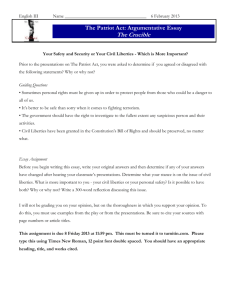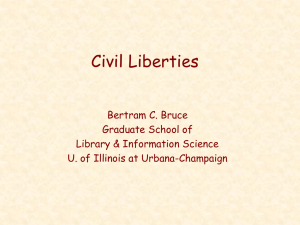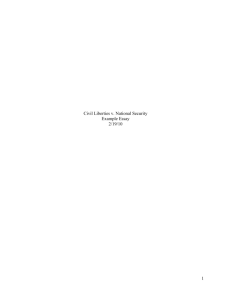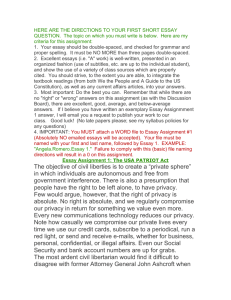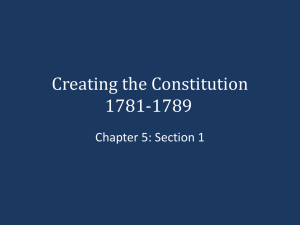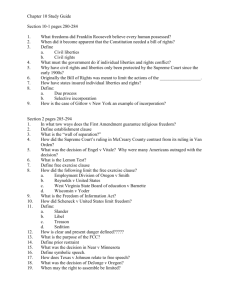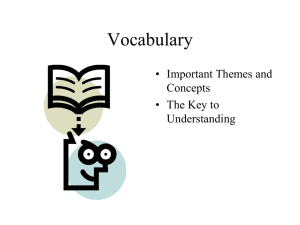Argumentative Writing Task Number Three with
advertisement
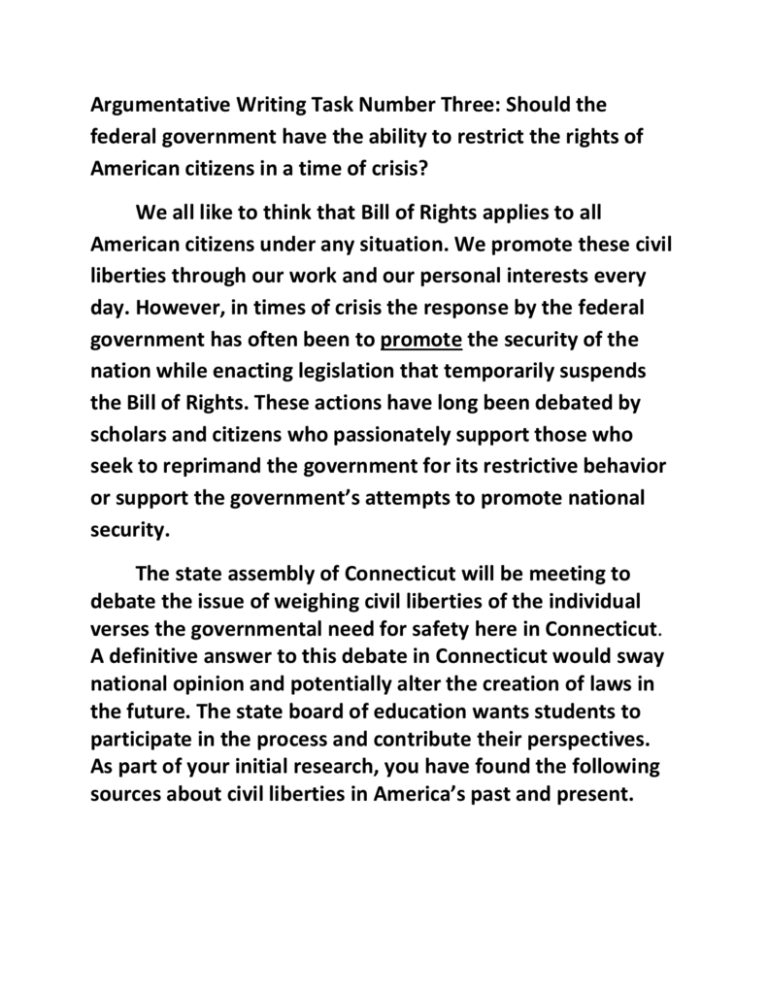
Argumentative Writing Task Number Three: Should the federal government have the ability to restrict the rights of American citizens in a time of crisis? We all like to think that Bill of Rights applies to all American citizens under any situation. We promote these civil liberties through our work and our personal interests every day. However, in times of crisis the response by the federal government has often been to promote the security of the nation while enacting legislation that temporarily suspends the Bill of Rights. These actions have long been debated by scholars and citizens who passionately support those who seek to reprimand the government for its restrictive behavior or support the government’s attempts to promote national security. The state assembly of Connecticut will be meeting to debate the issue of weighing civil liberties of the individual verses the governmental need for safety here in Connecticut. A definitive answer to this debate in Connecticut would sway national opinion and potentially alter the creation of laws in the future. The state board of education wants students to participate in the process and contribute their perspectives. As part of your initial research, you have found the following sources about civil liberties in America’s past and present. PART ONE: The Sources You will now examine several sources. You can re-examine any of the sources as often as you would like. After looking at the sources, use the rest of the time in PART ONE to answer the questions about them. Your answers to these questions will be scored. Also, your answers will help you think about the information you have read and looked at, which should help you write your argumentative essay. Feel free to highlight the sources or take any notes down that you want. Bill Moyers is an American Sources for PART ONE of the Performance Task: journalist and political commentator. He served as White House Press Secretary in Source One: “Civil Liberties in Wartime” by Bill Moyers the Johnson administration from 1965 to 1967. He also worked In time of war the laws are silent. --Marcus Tullius Cicero (106 - 43 B.C.), Roman orator, philosopher, statesman. as a network TV news commentator for ten years. If the fires of freedom and civil liberties burn low in other lands they must be made brighter in our own. --Franklin D. Roosevelt, 1938 The history of liberty is a history of resistance. The history of liberty is a history of limitations of government power, not the increase of it. --Woodrow Wilson What a strange time it was! Who knew his neighbor? Who was a traitor and who a patriot? The hero of to-day was the suspected of to-morrow.... There were traitors in the most secret councilchambers. Generals, senators, and secretaries looked at each other with suspicious eyes. --M. E. W. Sherwood on spying in Washington, D.C., in 1862-1863, when it was a Civil War camp. THE ALIEN AND SEDITION ACTS, 1798 John Adams legacy has been clouded by the four laws enacted by the Federalistcontrolled U.S. Congress under his watch. Provoked in part by unease over the French Revolution, privateering on the seas, and diplomatic maneuvers from Britain, the laws were also created to undermine Thomas Jefferson's Republican Party, who sympathized with the French Revolutionaries. The Naturalization Act changed the time of residence necessary for citizenship (and thus voting) from five to 14 years. Coincidentally, immigrants tended to vote Republican. The Alien Act and the Alien Enemies Act gave the President the power to imprison or deport aliens suspected of activities posing a threat to the national government. The Sedition Act posed the biggest challenge to civil liberties, undermining the core of the First Amendment protections of free speech and press. It prohibited spoken or written criticism of the government, the Congress, or the President. "That if any person shall write, print, utter or publish, or shall cause or procure to be written, printed, uttered or published, or shall knowingly and willingly assist or aid in writing, printing, uttering or publishing any false, scandalous and malicious writing or writings against the government of the United States, or either house of the Congress of the United States, or the President of the United States, with intent to defame the said government, or either house of the said Congress, or the said President..." Sedition Act, 1798 SUSPENSION OF HABEAS CORPUS, CIVIL WAR President Lincoln interfered with freedom of speech and of the press and ordered that suspected political criminals be tried before military tribunals. Probably Lincoln's most controversial act was suspending the writ of habeas corpus, a safeguard of liberty that dates back to English common law and England's Habeas Corpus Act of 1671. Habeas corpus says that authorities must bring a person they arrest before a judge who orders it. The U.S. Constitution says: "The privilege of the writ of habeas corpus shall not be suspended, unless when in cases of rebellion or invasion the public safety may require it." But Lincoln suspended habeas corpus without waiting for Congress to authorize it. Lincoln's action meant that individuals could be arrested and held without formal charges being lodged against them. The ruling brought Lincoln into conflict with the Chief Justice of the United States, Roger B. Taney. The case was that of John Merryman, a Southern sympathizer who had organized soldiers to burn bridges in Maryland. Taney ruled that Lincoln's order violated Article 1, Section 9, of the U.S. Constitution, which gave only Congress the power to suspend habeas corpus. Lincoln ignored the ruling. Congress ratified the suspension in 1863. Civil War scholars generally point to the large pockets of anti-war sentiment in the Union states as a justification for his wartime suspension of civil liberties. Today there are many "Confederate" Web sites which label Lincoln a "dictator" for these wartime acts. "The President certainly does not faithfully execute the laws, if he takes upon himself legislative power, by suspending the writ of habeas corpus, and the judicial power also, by arresting and imprisoning a person without due process of law." --Ex Parte Merryman by Chief Justice Roger B. Taney, Maryland Circuit Court (1861) WORLD WAR I, RED SCARE AND PALMER RAIDS The same Woodrow Wilson who lauded the limitations of government in the quotation above, acted quite differently when his government went to War in 1917. Soon after declaring war on Germany and its allies in 1917, Congress ruled that the U.S. mail could not be used for sending any material urging "treason, insurrection or forcible resistance to any law." It punished offenders with a fine of up to $5,000 and a five-year prison term. The government soon banned magazines including THE MASSES and THE NATION from the mails for expressing anti-war sentiment. The repression of dissident views continued after the war was over, under Wilson's Attorney General A. Mitchell Palmer and his assistant, J. Edgar Hoover. In December of 1919, in their most famous act, Palmer's agents seized 249 resident aliens who were promptly shipped to the Soviet Union. All manner of ideas were suspect in this climate; union activities, feminists, advocates of birth control and proponents of Cubism all found themselves under suspicion. In 1920, THE NATION documented the case of "The Most Brainiest Man," a Connecticut clothing salesmen was sentenced to sixth months in jail simply for saying Lenin was smart. "The tongues of revolutionary heat were licking the alters of the churches, leaping into the belfry of the school bell, crawling into the sacred corners of American homes, seeking to replace marriage vows with libertine laws, burning up the foundations of society." --A. Mitchell Palmer, "The Case Against the Reds" WORLD WAR II - JAPANESE INTERNMENT Soon after the bombing of Pearl Harbor, President Roosevelt, also quoted above, signed Executive Order 9066, which authorized the military to remove Japanese-Americans from America's West Coast. The removal was designed to protect military bases and manufacturing plants from "Fifth Column" sabotage or Japanese attack. In this case it was not foreign nationals who were moved into camp, but also American citizens of Japanese descent. In total 110,000 persons of Japanese ancestry were relocated from the West Coast to 10 American concentration camps in seven states: California, Wyoming, Idaho, Utah, Arizona, Colorado and Arkansas. The relocated consisted of both the Issei, first-generation immigrants who were barred from U.S. citizenship, and their children, the Nisei, born in this country as U. S. citizens. Twothirds of those incarcerated were U.S. citizens. Those citizens were forced to sell their businesses, homes and farms at rock-bottom prices - they lost their hold on their American lives and citizenship. In 1980, President Jimmy Carter signed legislation to create the Commission on Wartime Relocation and Internment of Civilians (CWRIC). In 1983, the CWRIC issued its findings in PERSONAL JUSTICE DENIED, concluding that the incarceration of Japanese Americans had not been justified by military necessity. With the The Civil Liberties Act of 1988: Redress for Japanese Americans the U.S. apologized to Japanese Americans for this grave injustice and this Act was signed into law, authorizing the payments of $20,000 to each person who had been evacuated in the 1940s. "A monetary sum and words alone cannot restore lost years or erase painful memories; neither can they fully convey our Nation's resolve to rectify injustice and to uphold the rights of individuals. We can never fully right the wrongs of the past. But we can take a clear stand for justice and recognize that serious injustices were done to Japanese Americans during World War II." --President George Bush, 1988 HUAC AND MCCARTHYISM Senator Joseph McCarthy's name has become a byword for the abuse of civil liberties and the malignant use of publicity to silence people of dissenting viewpoints. However, what we generally lump under the rubric of McCarthyism has longer, deeper roots. A main implement of the Cold War Red Scare was the House of UnAmerican Activities Committee (HUAC), set up by Congress under Martin Dies in 1938 to investigate people suspected of unpatriotic behavior. By 1947 HUAC had turned its attention to Hollywood and the public airwaves. The Committee called many people to testify about "Communist" influence in the industry. Those testifying were encouraged to "name names" of those they knew with ties to the Communist Party or with leftist agendas (anything from labor activism to support for Spanish Civil War refugees to civil rights activism). Ten "unfriendly witnesses" took the Fifth Amendment but were found guilty of contempt of Congress and each was sentenced to between six and twelve months in prison. Soon after, in June, 1950, came the publication of RED CHANNELS, a pamphlet written by former FBI agents purporting to list the leftists in the entertainment industry deserving of blacklisting for their leftist views. On 9th February, 1950, Joseph McCarthy, a senator from Wisconsin, made a speech claiming to have a list of 205 people in the State Department known to be members of the American Communist Party. The list of names was not a secret and had been in fact published by the Secretary of State in 1946. McCarthy and his friend, J. Edgar Hoover, were off and running, instituting four years of hearings in the superheated atmosphere of the Cold War. Many of the domestic spying techniques employed under Hoover's stewardship of the F.B.I. at this time were later ruled unconstitutional. Indeed, McCarthy went virtually unchallenged for several years until some leading figures, most notably, Edward R. Murrow, took on the Senator for his tactics. However, it was really his hearings questioning the soundness of the guardian against the Communist menace, the U.S. Army, that brought him down. In 1954 censure motion in the Senate condemned his conduct by 67 votes to 22. Source 2 - “What is the Patriot Act? A view in the positive” by John Carter In these days of Post 9/11, in the days of terrorism, and the days of Illegal immigration, we must know who is in our country and why they are here. With our open borders and many illegal immigrants (some of which are terrorists) coming in with fraudulent documents, what legal way do we have to keep America safe from the terrorists who are already in our country. How do we do this? The Patriot Act. But what is the Patriot Act? John Carter is a US Congressional Representative. He is a member of the Republican Party and represents the 31st congressional district. The USA PATRIOT Act is an Act of Congress which President George W. Bush signed into law on October 26, 2001. The acronym stands for: Uniting and Strengthening America by Providing Appropriate Tools Required to Intercept and Obstruct Terrorism Act of 2001 (Public Law 107-56). The act was passed 45 days after the September 11, 2001 attacks on the World Trade Center in New York City. It substantially expanded the authority of U.S. law enforcement agencies for the stated purpose of fighting terrorism in the United States and abroad. Among its provisions, the Act increased the ability of law enforcement agencies to search telephone and email communications and medical, financial and other records; eased restrictions on foreign intelligence gathering within the United States; expanded the Secretary of the Treasury's authority to regulate financial transactions, particularly those involving foreign individuals and entities; and enhanced the discretion of law enforcement and immigration authorities in detaining and deporting immigrants suspected of terrorism-related acts. The act also expanded the definition of terrorism to include "domestic terrorism," thus enlarging the number of activities to which the Patriot Act's expanded law enforcement powers can be applied. Now a lot of people around the U.S. have come out in opposition to the Patriot Act, because they believe it is an invasion of privacy, and against the constitution. They get this claim by quoting the 4th amendment which says: "The right of the people to be secure in their persons, houses, papers, and effects, against unreasonable searches and seizures, shall not be violated, and no Warrants shall issue, but upon probable cause, supported by Oath or affirmation, and particularly describing the place to be searched, and the persons or things to be seized." People think that the Patriot Act is breaking this amendment's rules, and that is why they are against it, but they don't know the truth behind the Patriot Act. People think that the government wiretaps random people, which is a violation of the constitution, but this is simply not the case. The Patriot Act is used by the FBI and the CIA, to discover if there might be a terrorist or a terrorism plot afoot, but they don't do this by the means the public think they do. They do not just randomly wiretap. What they do is they sit down at a computer and enforce a tactic known as Data-mining. They type a word like Terrorism or Bomb into the computer, and then their computer will go through computers around the country, looking for these words on a computer. If they find the word they were searching for, they will then look at that document. If it the document says something like: "Police arrest NJ man with bomb strapped to chest", then they will leave it alone and keep searching. But if they find an email saying: Dear Dave, I am building a bomb, and I am planning to blow up the U.N., then because of this proof, they are now presented with probable cause. They then MIGHT wiretap that person to see what their exact plans are, and because of this, they are able to arrest the terrorist/bomber and the U.S. is safer for it. So contrary to popular belief, the FBI/CIA/Government does NOT see all your private information, they do not know more than they need to about you, because since they only Datamine for certain words, no one will see your personal info and documents that do not contain the words they search for. Since 9/11 we have caught 17 potential acts of terrorism, because of the Patriot Act. And with as many as 15 known Al'Queda terrorist cells in the U.S. today, the Patriot Act is one of the most needed tools in the War on Terrorism. The Patriot Act is not an infringement on personal liberty, and it is not an invasion of privacy because it does not violate the 4th amendment, it is fully constitutional. In a time of terrorists and terrorism, America must be kept safe from harm, and if we are to do so legally, constitutionally, and rationally, the Patriot Act must be kept around. It is a good thing, and it is constitutional (which is REALLY important), and it will help to keep us safe. Source Three: “In Defense of the Patriot Act” by Amitai Etzioni Amitai Etzioni served as a senior advisor to the Carter White House; taught at Columbia University, Harvard and The University of California at Berkeley; and is a university professor and professor of international relations at The George Washington University. Many of the commentaries elicited by the tenth anniversary of the Patriot Act are as polarized as other elements of our public discourse. On the one hand, there are those who argue that the threat of terrorism is vastly exaggerated, that fear-mongering is used to deprive Americans of their basic rights, and that terrorists could be dealt with as just another kind of criminal—by the police and civilian courts. Then there are those who maintain that anyone who opposes reasonable security measures is aiding and abetting the enemy and that torture and extraordinary renditions have shown themselves to be vital to aborting major additional attacks on our homeland. If one moves away from such one-sided, overarching positions, one realizes that we face two major legitimate goals—protecting national security and respecting individual rights—and that neither should trump the other. The tension between them can be worked out. Indeed, this key thesis is reflected in the Fourth Amendment, which holds that there be no unreasonable searches and seizures. That is, the Constitution recognizes that some searches do not violate rights and are fully legitimate. And it provides a criterion for determining which are acceptable: those that a reasonable person will recognize as proper. Needless to say, such recognition changes over time—for instance, after events such as 9/11. One next examines various new security measures included in the Patriot Act on the basis of their reasonableness rather than condemning or embracing the act wholesale. It contains 161 provisions, only about ten of which have been seriously contested by anybody. Moreover, many of the security measures that have troubled many Americans—including the use of torture, indeterminate detention and extraordinary renditions—are not part of the Patriot Act. True, it was originally enacted in great haste. However, it has since been reviewed and extended several times. The most important provisions of the Patriot Act seem to meet the criterion of reasonableness. Phones: Before the Patriot Act was passed, authorities had to obtain a court's permission to tap a phone, but the warrant had to be "particularized" to a given instrument, reflecting the days when most people had just one phone. Cell phones made this narrow rule obsolete. The Patriot Act changed this requirement to attach warrants to a suspect, rather than to one of his instruments in particular. It merely allowed the law to catch up with technological development. Libraries: Critics have been outraged by the right of the government to search the computers of public libraries. Actually, the term "library" is not mentioned in the act. The bill authorizes searches of "books, records, papers, documents and other items... to protect against international terrorism or clandestine intelligence activities." Critics singled out libraries because such searches evoked more public outrage than if one referred to the actual wording of the bill. While critics argued that this measure would or could have a chilling effect, this observer, at least, is unaware of credible evidence to support this claim. Homes: The "sneak and peek" clause has been particularly vilified. The act grants authorities the right to search a home without notifying the owner for a period of days. But how long is enough? Russ Feingold favored seven days; Republicans in the House wanted 180 days. But there was little discussion of the grubby details of conducting such a search. How long does it take to de-encrypt a PC? To translate messages? To find collaborators? Clearly, some delay seems reasonable. This provision was amended in 2005 to detail that notification must be provided within 30 days (unless the facts of the case justify a longer delay, which must be overseen by a court and consists of periods of 90 days). E-mail: Another reasonable new measure changed search warrants from local to national when dealing with the Internet. E-mail often is stored remotely on the servers of Internet service providers (ISPs). Under old laws, search warrants applied only to the jurisdiction in which the search would take place. This meant that if a suspect in, say, New Jersey had e-mail stored on a server located in, say, Silicon Valley, an agent would have to travel across the country to obtain a warrant to seize the e-mail in the jurisdiction in which the server was located. Under the Patriot Act, judges in districts with jurisdiction over particular crimes are allowed to grant search warrants to seize electronic communications stored outside that judge’s jurisdiction. There is room for debate about how far we need to go to protect ourselves. However, the fact that there has been no successful attack for ten years—and that those that were attempted in the U.S. (that we know about) were particularly inept—should not lull us into letting our guard down. One cannot ignore that survey after survey shows that there are many millions of people throughout the world (and some right here, at home) who hate our guts and wish us harm. We need to recall the words of a terrorist who explained: “You need to be lucky all the time; I need to be lucky just once.” And we ought not to confuse the main features of the Patriot Act—which meet the criteria of reasonableness—with other new security measures, measures that have crossed the line that separates what free societies will do to defend themselves and that which they consider repugnant. We would rather absorb some risk to our security than behave like, well, terrorists. Source Four: “Civil Liberties vs. Security: Public Opinion in the Context of the Terrorist Attacks on America” by Darren W. Davis and Brian D. Silver Darren W. Davis is Associate In the tradition of research on political tolerance and democratic rights in Professor of Political Science, context, this study uses a national survey of Americans conducted shortly Michigan State University. Brian after September 11, 2001 attack on America to investigate people’s D. Silver is Professor of Political willingness to trade off civil liberties for greater personal safety and Science, Michigan State security. We find that the greater people’s sense of threat, the lower their University. support for civil liberties. This effect interacts, however, with trust in government. The lower people’s trust in government, the less willing they are to trade civil liberties for security, regardless of their level of threat. African Americans are much less willing to trade civil liberties for security than whites or Latinos, even with other factors taken into account. This may reflect a longstanding commitment to the struggle for rights. Liberals are less willing to trade off civil liberties than moderates or conservatives, but liberals coverage towards the position taken by conservatives when their sense of the threat of terrorism is high. While not a forecast of the future, the results indicate that Americans’ commitment to democratic values is highly contingent on other concerns and that the context of a large-scale threat to national or personal security can induce a substantial willingness to give up rights. In response to a general question of giving up some civil liberties in order to curb terrorism in this country, 55% favored protecting civil liberties. After the terrorist attacks, however, this level of support for civil liberties breaks down when applied to specific situations. In our Civil Liberties Survey, when the value trade-off is framed as the need to be safe and secure against judging people guilty by association – ‘people who belong to or associate with terrorist organizations should be considered a terrorists’ – 71% support treating people as guilty based on their associations. In a trade-off of values involving support for freedom of speech, 60% think that schoolteachers should not criticize US antiterrorism policy but should promote loyalty to the country. In a trade-off involving the right to privacy, 54% support requiring national identity cards. TABLE 1 Civil Liberties vs. Security Responses Panel A. Percentage of Prosecurity or Pro-Civil Liberties Responses to Each Item Questions 1. Give up some civil liberties 2. Investigate protestors 3. Racial Profiling 4. Warrantless searches on suspicion 5. Monitor telephone and e-mail 6. Detain non-citizens indefinitely 7. Require national ID cards 8. Teachers criticize antiterrorist policies 9. Crime to belong to terrorist organization Prefer Security 45 8 18 23 34 47 54 60 71 Civil Liberties 55 92 82 77 66 53 46 40 29 Source Five: “Civil Liberties in a Time of Crisis” By James X. Dempsey James X. Dempsey is deputy director of the The terrorist attacks of September 11th represented a quantum leap in the deadliness Center for Democracy and audacity of terror. They revealed a vulnerability that many in the United States and Technology had never before appreciated. And they spurred adoption of many sound initiatives where he specializes to better prevent terrorism. Unfortunately, they also triggered a startling surrender of in privacy and fundamental democratic principles in an attempt to purchase enhanced security – an electronic effort that is not only constitutionally unsound but also likely to counterproductive. surveillance issues. Within weeks of the attacks, thousands of individuals were arrested and held without criminal charges, under a shroud of secrecy. Attorney General John Ashcroft compromised the Sixth Amendment right to effective legal counsel by ordering officials to wiretap attorney-client telephone calls without judicial approval. President Bush authorized the creation of military courts to secretly try terrorism suspects. And Congress fundamentally rewrote the surveillance laws and increased the powers of both the FBI and the CIA to collect information within the U.S. on citizens and noncitizens alike. Criticizing these measures does not deny the frightening risks our nation faces. There likely will be additional terrorist attacks on our soil and against U.S. interests abroad. It is even possible that some attacks will involve biological, chemical, or nuclear materials. Yet, it is precisely because the risk is so high that we need to preserve the fullest range of due process and accountability in the exercise of government powers. The False Trade-Off Between Freedom and Security The debate over terrorism is often framed as a trade-off between liberty and security. This is a flawed calculus, in several respects. First, many civil liberties, far from being at odds with security, actually enhance the ability of the government to defend the common good. We guarantee the right to confront one’s accusers, for example, not only as an element of human dignity but also because crossexamination exposes lies and forces the government to continue looking until the truly guilty party is found. Similarly, we subject government decisions to public scrutiny and judicial review not only to give voice to individuals but also because openness and accountability can produce a fuller factual record, expose faulty assumptions, and slow the rash decision making of elected officials acting under pressure. We protect freedom of speech not only because it allows room for personal self-expression, but also because it promotes the stability that comes from the availability of channels for dissent and peaceful change. For these and other reasons, surrender of freedom in the name of fighting terror is not only a constitutional tragedy, it is also likely to be ineffective and worse, counterproductive. The attorney general has said that foreign terrorists "do not deserve the protection of the American Constitution." What the attorney general does not seem to appreciate, however, is that it is precisely the procedures of the Constitution by which we reliably determine who is a terrorist and who is not. Second, policymakers too frequently curtail civil liberties without ever actually analyzing whether civil liberties in fact pose an impediment to security. September 11 proved in the worst way that the U.S. anti-terrorism effort was flawed. The governmental reaction to the events of that day is doubly distressing not merely because it curtails civil liberties but also because it has done so with no consideration of what went wrong in the days and months before and little regard to whether the liberty-curtailing changes will be effective. The fact that U.S. authorities failed to detect the September 11 attack in advance should have prompted a comprehensive review of our intelligence capabilities. But Congress enacted many of the provisions of the Bush administration’s anti-terrorism law, the USA Patriot Act (Patriot Act), without ever identifying what problems they were intended to cure or how the additional authorities would make a difference. Finally, even in the area of surveillance and privacy, the choice is not between surveillance powers and no surveillance powers. Civil libertarians engaged in the debate over the new terrorism laws do not argue that the government should be denied the tools it needs to monitor terrorists’ communications. Instead, privacy advocates urge that those powers be focused and subject to clear standards and judicial review. The tragedy of the response to September 11 is not that the government has been given new powers—it is that those new powers have been granted without standards or checks and balances. Source Six: “Ebola scare poses dilemma: Civil rights versus public safety” by David Hench David Hench is a staff writer for the Portland Press Herald. The specter of an Ebola outbreak in the United States, no matter how unlikely, has led some states to take the extraordinary step of requiring an entire group of people to be quarantined even though the risk they pose to the public may be remote. That situation has led to a potential showdown between Kaci Hickox and Maine officials over whether the nurse can be quarantined against her will. Hickox was previously isolated in a special tent at University Hospital in New Jersey after she returned to the US on Friday from treating Ebola patients in West Africa. She was the first person affected by the mandatory quarantine that New Jersey Gov. Chris Christie has imposed for anyone entering that state who had worked with Ebola patients. Hickox, who worked in Sierra Leone for Doctors Without Borders, shows no symptoms of Ebola, which is necessary to transmit the potentially fatal disease, but Maine health officials say if she does not abide by the quarantine, they will seek a court order to enforce it. The issue highlights the conflict between an individual’s civil rights and the public’s expectation that the government will do what it must to keep them safe. “Normally one can’t be locked up without suspicion of a crime or conviction, but because infections are catching and because they can be spread by people who are not visibly sick, the state has the right to protect society from disastrous consequences by temporarily limiting someone’s liberties,” said Eugene Kontorovich, a constitutional law scholar at Northwestern University Law School in Chicago. Health officials in the U.S. have a long history of taking steps in the interest of public health, including closing schools and ordering large-scale quarantines, such as the one imposed during the 1918 influenza epidemic that was credited with limiting the spread of the disease. By contrast, a requirement in 1900 that Chinese residents in San Francisco be inoculated and quarantined after an outbreak of a plague was overturned by the courts. Courts have generally sided with the state in instances when civil liberties are pitted against public health, Kontorovich said. Source Seven: View the links and answer the questions that follow https://www.youtube.com/watch?v=Gcuf3gwiHZA What is the key term for Chief Advisor John Brennan when balancing security and civil liberties? __________________________________________________________________ __________________________________________________________________ What is happening to disrupt any further terrorists attacks? __________________________________________________________________ __________________________________________________________________ https://www.youtube.com/watch?v=BU0ZxMfC7tc What was the thesis of the news clip? __________________________________________________________ __________________________________________________________ Source Eight: Political Cartoon Analysis Which of the political cartoons conveys the cartoonist’s message most effectively? How? __________________________________________________________ __________________________________________________________ “Should the government have the ability to restrict the rights of American citizens in times of crisis?” Argumentative Performance Task PART TWO: THE ESSAY You will now review your notes and sources in order to plan, draft, revise and edit your writing. You may use your notes and refer to the sources. Your Assignment After completing your research, you shared your findings with your favorite teacher. They have suggested to you that you write a 5 paragraph argumentative essay that discusses the restricting of civil liberties in times of conflict. You will be able to read the essay before a session of state assembly and be taken seriously as a representative for all the students in the state. Take a stance in your essay. Make sure you establish an argumentative claim, address potential counterarguments, and support your claim from the sources you have read. Develop you ideas clearly and use your own words, except when quoting directly from the sources. Be sure to reference at least 4 sources by author or number when using details or facts directly from the sources. Review the rubric that will be used to score your essay before beginning to write. If you have questions about organization/purpose, evidence/elaboration, or conventions please ask. Manage your time carefully so that you can complete the following: Plan your multi-paragraph argumentative essay Write your multi-paragraph argumentative essay Revise and edit the final draft of your multi-paragraph argumentative essay
